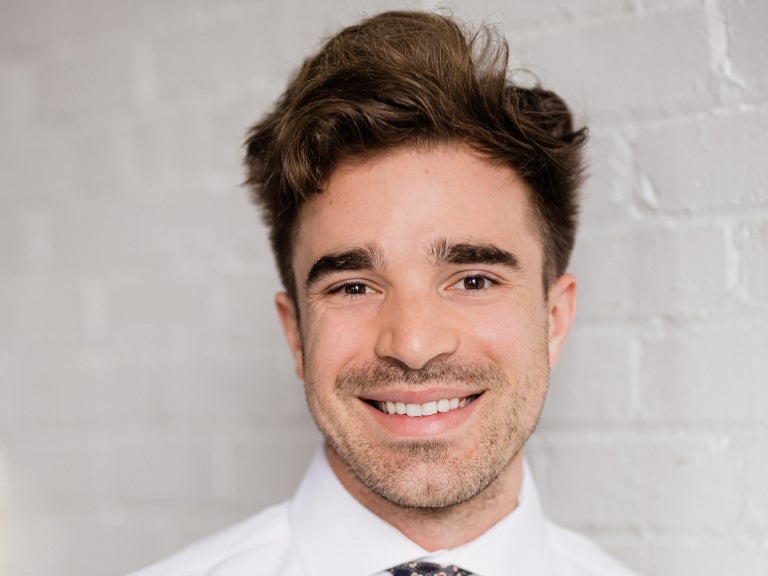
Vincent Reginella (MS ’16)
There are many paths you can take with your master's degree in Clinical Mental Health Counseling at Pitt. While our program has evolved slightly since this featured alumna graduated; a degree from the Clinical Mental Health Counseling (Counseling) program at the School of Health and Rehabilitation Sciences (SHRS) can prepare you for similar career outcomes.
See what Vincent Reginella has to say!
Q: Tell us about yourself.
A: I graduated in 2016 from the master's program in Clinical Rehabilitation and Mental Health Counseling and I've been in private practice for almost six years at this point, since 2017. I am currently in the process of earning my doctorate in psychology at Carlow University.
Q: What do you do on a daily basis in your practice?
A: I do individual mental health counseling. I am a licensed professional counselor (LPC) in Pennsylvania, and I'm an out-of-state provider in Florida as well. I work with people who have traumatic brain injuries and concussions. I also work with athletes on sports performance counseling where we address mental blocks that might be inhibiting their performance on the field.
I also help athletes transition away from their sport once they decide to move on to a different phase of their life. We focus on a lot of elements transitioning from being an athlete to, not necessarily a non-athlete, but just a different kind of identity.
I also see a lot of clients, usually young adults who are students, trying to figure things out. Growing up isn't easy for anybody! Sometimes we'll focus on developing a system to be more efficient with managing their time or their learning or studying habits, or tactics for handling academic pressure and navigating their academic workload.
I will also see a lot of people who generally want to work on managing their anxiety in different aspects across the lifespan.
Q: How did you know you wanted to pursue a degree in counseling?
A: When I went to college, I actually wanted to major in history because I've always been kind of a history buff. That was my plan, but I played soccer in college as well. As a student athlete, that's kind of how I found my way into this field.
In the preseason of my sophomore year of college, I tore my ACL and I was out for a while rehabbing my knee. During that time, I rehabbed alongside a couple of teammates who had sustained concussions. The NCAA, at that point, didn't necessarily have a clear protocol in terms of ‘How do you handle that?.’ At that time, I was also taking neuroscience and psychology courses during my undergrad. We were learning about head trauma, head injuries and learning about how any insult or injury to the brain and what it can do in terms of behavioral changes.
From there, I started down the path as a neuroscience major and I took some psychology courses that I found interesting. I always had an interest in the intersection between brain and behavior, so neuropsychology is kind of a bridge between neuroscience and psychology and that was kind of always in my wheelhouse.
In the end, I graduated with a psychology degree. How I found Pitt was when I went to a conference in 2014 during my senior year. There were some representatives there talking about the counseling program.
From there, you know, I might have taken a peek at maybe one or two other universities and programs, but Pitt’s made the most sense given that I'm from Pittsburgh and I was planning on moving back to the area after graduation. I applied to the master's program shortly after that.
Q: During your time in the program, can you remember any faculty, staff or other fellow students during your time here that may have helped you along the way or were most memorable?
A: I would say the one that stands out the most in terms of faculty was Assistant Professor Kelly Beck. When I was in the program, she was finishing up her PhD. Beck was definitely a positive influence on me and my time in the program and definitely helped me along the way. I learned a lot from her.
Going into the master’s program, I had zero experience working in the field because I went directly from undergrad to grad school. She was instrumental in helping me to get my bearings and experience what it is like to work in the field. I learned some important lessons that, even now, I still draw upon.
Q: What sets Pitt’s program apart from others?
A: Pitt’s program is practical. The program is relatively straightforward compared to other graduate programs I've come across in my personal career path. I think practicality and pragmatism goes a long way. Frankly, I think those two concepts are overlooked in a lot of different aspects of our profession.
Every class that I took made sense now that I am practicing. I look back on classes that I am currently applying in my everyday practice.
Pitt's program, and the classes, helped develop my personal and my professional identity. They also highlighted the importance of understanding, to some capacity, other aspects of health care that will impact somebody's mental health that you might be working with. So, something like a medical terminology class, which I took while in the program, helps you understand words and basic concepts like that. They are helpful to know and can separate you as a mental health therapist from those who don't have exposure to different fields or disciplines.
Q: If you had to do it all over again, would you pick Pitt or would you explore other opportunities for this degree?
A: No, no, I would pick Pitt every time!
---
Published May 10, 2023
